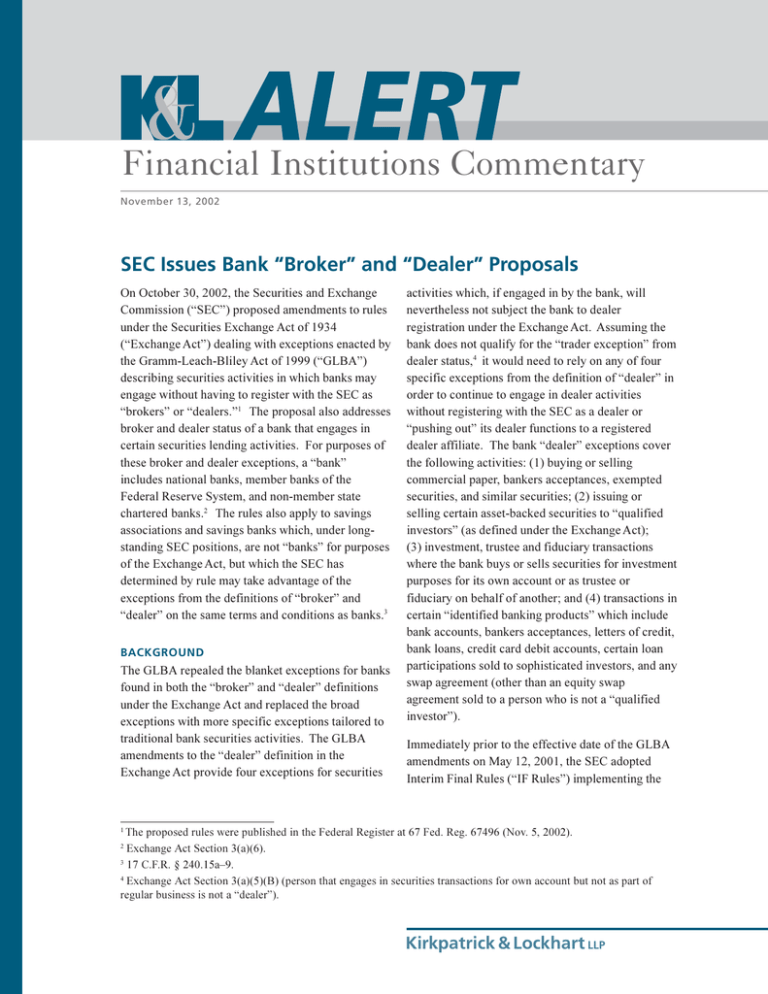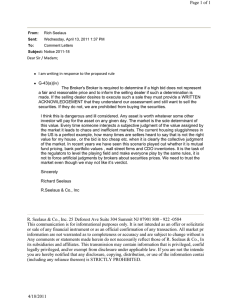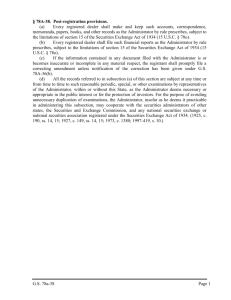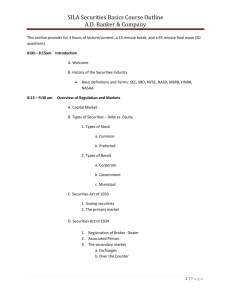
Financial Institutions Commentary
November 13, 2002
SEC Issues Bank “Broker” and “Dealer” Proposals
On October 30, 2002, the Securities and Exchange
Commission (SEC) proposed amendments to rules
under the Securities Exchange Act of 1934
(Exchange Act) dealing with exceptions enacted by
the Gramm-Leach-Bliley Act of 1999 (GLBA)
describing securities activities in which banks may
engage without having to register with the SEC as
brokers or dealers.1 The proposal also addresses
broker and dealer status of a bank that engages in
certain securities lending activities. For purposes of
these broker and dealer exceptions, a bank
includes national banks, member banks of the
Federal Reserve System, and non-member state
chartered banks.2 The rules also apply to savings
associations and savings banks which, under longstanding SEC positions, are not banks for purposes
of the Exchange Act, but which the SEC has
determined by rule may take advantage of the
exceptions from the definitions of broker and
dealer on the same terms and conditions as banks.3
BACKGROUND
The GLBA repealed the blanket exceptions for banks
found in both the broker and dealer definitions
under the Exchange Act and replaced the broad
exceptions with more specific exceptions tailored to
traditional bank securities activities. The GLBA
amendments to the dealer definition in the
Exchange Act provide four exceptions for securities
activities which, if engaged in by the bank, will
nevertheless not subject the bank to dealer
registration under the Exchange Act. Assuming the
bank does not qualify for the trader exception from
dealer status,4 it would need to rely on any of four
specific exceptions from the definition of dealer in
order to continue to engage in dealer activities
without registering with the SEC as a dealer or
pushing out its dealer functions to a registered
dealer affiliate. The bank dealer exceptions cover
the following activities: (1) buying or selling
commercial paper, bankers acceptances, exempted
securities, and similar securities; (2) issuing or
selling certain asset-backed securities to qualified
investors (as defined under the Exchange Act);
(3) investment, trustee and fiduciary transactions
where the bank buys or sells securities for investment
purposes for its own account or as trustee or
fiduciary on behalf of another; and (4) transactions in
certain identified banking products which include
bank accounts, bankers acceptances, letters of credit,
bank loans, credit card debit accounts, certain loan
participations sold to sophisticated investors, and any
swap agreement (other than an equity swap
agreement sold to a person who is not a qualified
investor).
Immediately prior to the effective date of the GLBA
amendments on May 12, 2001, the SEC adopted
Interim Final Rules (IF Rules) implementing the
The proposed rules were published in the Federal Register at 67 Fed. Reg. 67496 (Nov. 5, 2002).
Exchange Act Section 3(a)(6).
3
17 C.F.R. § 240.15a9.
4
Exchange Act Section 3(a)(5)(B) (person that engages in securities transactions for own account but not as part of
regular business is not a dealer).
1
2
Kirkpatrick & Lockhart LLP
bank broker and dealer exceptions enacted by the
GLBA.5 The SEC, by order, delayed the effective
date of the GLBA amendments on three occasions,
most recently in a companion order to these new
proposals that extend the effective date of the dealer
exception to February 12, 2003. The proposed
amendments to the IF Rules, discussed below, are in
response to comments from the industry in narrowly
focused areas of the IF Rules. The recent proposed
amendments focus on: (1) the application of the 500
de minimis transaction exception from broker status
for riskless principal transactions; (2) the
application of the asset-backed transactions
exception and the meaning of originate and
predominantly originated by under rules
implementing the asset-backed exception; (3) the
exceptions from broker and dealer status in
connection with certain bank securities lending
activities; and (4) a technical clarification of the
definition of qualified investors.
The comment period is scheduled to expire on
December 5, 2002, and the SEC expects to have the
dealer rules finalized on or prior to February 12,
2003, the current effective date for the rules
implementing the bank dealer exceptions. The SEC
expects to phase in the rules implementing the dealer
exception and has requested comment on an
appropriate phase-in schedule.
The SEC has not yet amended the broker
implementing rules, and the SEC staff has not
informally indicated when the industry may expect to
see amendments to those implementing rules. Banks
are operating under an order delaying the effective
date of the broker definition scheduled to expire
May 12, 2003.
PROPOSED AMENDMENTS
Riskless Principal Transactions
Section 3(a)(5) of the Exchange Act defines a
dealer generally as a person who is engaged in the
business of buying and selling securities for its own
account, but excepts persons who do not buy or sell
securities as part of a regular business. Under the
securities laws, as interpreted by the SEC, the phrase
5
buying and selling securities for such persons own
account means purchasing and selling securities as
principal, which includes riskless principal
transactions. A riskless principal transaction
includes securities trades in which the dealer, if
executing a buy (or sell) order from (or to) a
customer, purchases (or sells) the security for its own
account in a contemporaneously offsetting
transaction, creating minimal risk to the dealer. The
SEC and its staff have long-standing positions that
treat riskless principal transactions as dealer
transactions, even in light of arguments that these
transactions are the functional equivalent of agency
transactions.
In contrast, the banking laws have traditionally
treated riskless principal transactions as agency
transactions. The proposal seems to find a
compromise between the securities and banking law
positions for the narrow purpose of the de minimis
exception from the broker definition for riskless
principal transactions, and not otherwise expand it to
other areas of the federal securities laws.
Formerly, IF Rule 3a51 excepted a bank from the
definition of a dealer if it effected no more than 500
securities transactions, including both agency and
principal transactions, per calendar year. Under IF
Rule 3a51, a riskless principal transaction by a bank
could count as two transactions under the 500
transaction limitation under certain circumstances.
Under the proposal, a riskless principal transaction in
which the bank is acting as a riskless principal will
count as only one transaction. The release states,
however, that if the bank offsets the risk of a
transaction with more than one counterparty, e.g.,
five counterparties on the other side, the bank must
count that as five transactions under the 500
transaction limit.
Definition of Terms Used in Asset-Backed
Transaction Exception to Dealer Registration
Section 3(a)(5)(C)(iii) of the Exchange Act provides
that a bank may engage in the issuance or sale to
qualified investors, through a grantor trust or other
separate entity, of securities backed by or
representing an interest in notes, drafts, acceptances,
The IF Rules were published in the Federal Register on May 18, 2001. See 66 Fed. Reg. 27760 (May 18, 2001).
Kirkpatrick & Lockhart LLP
2
loans, leases, receivables, other obligations or pools
of any of these obligations predominantly originated
by the bank, an affiliate of the bank other than a
broker-dealer or a syndicate of banks of which the
bank is a member, if the obligations or pool of
obligations consists of mortgage obligations or
consumer-related receivables. The proposed
amendments to IF Rule 3b18 respond to the
comments requesting greater clarity of the definitions
originate and predominantly originated
previously defined in IF Rule 3b18.
The SEC proposes to expand the definition of
originated by considering obligations that a bank
initially approves and underwrites, or agrees to
purchase, to be originated by the bank as long as
the bank meets two conditions. First, the obligation
must conform to the banks underwriting standards or
be evidenced by the banks documents. Second, the
bank would be required to fund the obligation within
six months after the obligation is created. Under the
proposal, it is expected that a bank could count the
assets originated under a loan origination channel,
such as automobile dealers, mortgage companies and
other consumer loan originators, as the banks
originations, even though the bank does not
actually make and fund the obligation at the precise
time the obligation is created. This new definition is
intended to cover pre-GLBA asset-backed
transactions.
The SEC did not propose to change the percentage of
originations necessary to demonstrate that the
obligations underlying the asset-backed securities
were predominantly originated by the bank and its
nonbroker-dealer affiliates. Thus, to qualify for the
asset-backed transaction exception, the bank and its
nonbroker-dealer affiliates or a syndicate would be
required to originate 85% of the obligations
underlying the pool of asset-backed securities.
Regarding syndicates, the SEC proposal would
define a syndicate as a group of banks that acts
jointly, on a temporary basis, to issue securities
backed by obligations originated by each of the
individual banks and their affiliates (other than
broker-dealer affiliates). The proposal continues
the requirement that, when a syndicate of banks
issues asset-backed securities through a grantor trust
or other separate entity, each bank and its nonbrokerdealer affiliates selling the securities, and thus acting
as a dealer in the transaction, must have originated
at least 10% of the value of the pool. The 10%
requirement is thus applicable only to those banks
that are actually engaged in selling the securities
backed by the pool because these are the only banks
that need to use the dealer exception. The proposal
would modify IF Rule 3b18, however, by allowing
securities originated by a banks affiliate to count
within the 10% requirement.
Securities Lending Transactions
Section 3(a)(4)(B)(viii) of the Exchange Act, as
amended by the GLBA, addresses securities lending
by custodian banks as an exception to the broker
definition. That exception permits a bank to effect
securities lending or borrowing transactions with or
on behalf of its customer, outside of broker-dealer
registration, when the bank is acting in a custodian
capacity. Under the Exchange Act, as amended by
the GLBA, there is no exception from the broker
definition when the bank is not acting as custodian
for the underlying securities. Additionally, there is
no exception from the dealer definition for banks
engaged in securities lending whether or not as
custodian.
The SEC proposed new Rule 15a11 to permit banks
to engage in custodial and non-custodial securities
lending activities, without having to register as a
broker or dealer, when engaged in securities lending
to qualified investors, whether the bank acts as
conduit lender or agent. In connection with a
securities lending transaction, the bank could select
and negotiate with a borrower and execute, or direct
the execution of, the loan with the borrower; receive,
deliver, or take custody of loaned securities; receive,
deliver, or take custody of collateral; provide certain
valuation and recordkeeping services; reinvest or
direct the reinvestment of cash collateral; and
indemnify the lender of securities. The proposed
exception requires a written securities lending
agreement, which would be a contract to conduct
securities lending transactions on behalf of a
qualified investor.
Kirkpatrick & Lockhart LLP
3
Definition of the Term “Qualified Investor”
Section 3(a)(54) of the Exchange Act enumerates an
extensive list of persons who qualify for the
designation qualified investor for purposes of
engaging with a bank in transactions in asset-backed
securities, securities loans, and equity swap
transactions. The SEC made technical clarifications
of the meaning to make it clear that the qualified
investor definition includes not only entities that are
companies, such as corporations or partnerships, but
other entities such as a trust that may not fall clearly
within the meaning of company. In so doing, the
SEC borrowed from the broad definition of
company in the Investment Company Act of 1940.
Thus, investment companies organized as trusts, that
engage in asset-backed, securities lending, or equity
swap transactions with banks will meet the
organizational prong of the qualified investor
definition.
Please feel free to contact any of the attorneys listed below with any questions you
may have on this proposal.
Rebecca H. Laird
Dirk Peterson
Donald W. Smith
Ira L. Tannenbaum
Dean E. Miller
William P. Wade
Stanley V. Ragalevsky
rlaird@kl.com
dpeterson@kl.com
dsmith@kl.com
itannenbaum@kl.com
dmiller@kl.com
wwade@kl.com
sragalevsky@kl.com
202.778.9038
202.778.9324
202.778.9079
202.778.9350
202.778.9371
310.552.5071
617.951.9203
®
Kirkpatrick & Lockhart LLP
Challenge us.®
www.kl.com
BOSTON
n
DALLAS
n
HARRISBURG
n
LOS ANGELES
n
MIAMI
n
NEWARK
n
NEW YORK
n
PITTSBURGH
n
SAN FRANCISCO
n
WASHINGTON
...........................................................................................................................................................
This publication/newsletter is for informational purposes and does not contain or convey legal advice. The information herein
should not be used or relied upon in regard to any particular facts or circumstances without first consulting a lawyer.
© 2002 KIRKPATRICK & LOCKHART LLP.
ALL RIGHTS RESERVED.




